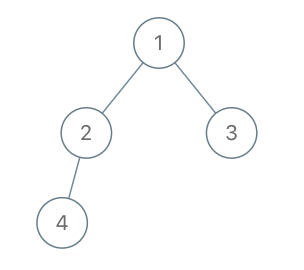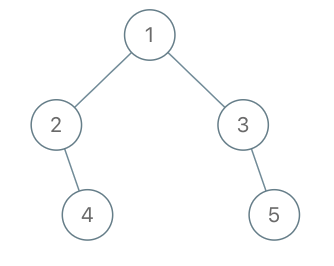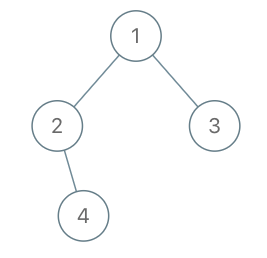在二叉树中,根节点位于深度 0 处,每个深度为 k 的节点的子节点位于深度 k+1 处。
如果二叉树的两个节点深度相同,但 父节点不同 ,则它们是一对堂兄弟节点。
我们给出了具有唯一值的二叉树的根节点 root ,以及树中两个不同节点的值 x 和 y 。
只有与值 x 和 y 对应的节点是堂兄弟节点时,才返回 true 。否则,返回 false。
输入:root = [1,2,3,4], x = 4, y = 3 输出:false
输入:root = [1,2,3,null,4,null,5], x = 5, y = 4 输出:true
示例 3:
输入:root = [1,2,3,null,4], x = 2, y = 3 输出:false
提示:
- 二叉树的节点数介于
2到100之间。 - 每个节点的值都是唯一的、范围为
1到100的整数。
1. BFS 实现
可以利用数组 p, d 记录每个节点对应的父节点以及深度。
2. DFS 实现
BFS:
# Definition for a binary tree node.
# class TreeNode:
# def __init__(self, val=0, left=None, right=None):
# self.val = val
# self.left = left
# self.right = right
class Solution:
def isCousins(self, root: TreeNode, x: int, y: int) -> bool:
p = list(range(110))
d = list(range(110))
q = deque([root])
i = 0
while q:
n = len(q)
for _ in range(n):
node = q.popleft()
d[node.val] = i
if node.left:
p[node.left.val] = node.val
q.append(node.left)
if node.right:
q.append(node.right)
p[node.right.val] = node.val
i += 1
return p[x] != p[y] and d[x] == d[y]DFS:
# Definition for a binary tree node.
# class TreeNode:
# def __init__(self, val=0, left=None, right=None):
# self.val = val
# self.left = left
# self.right = right
class Solution:
def isCousins(self, root: TreeNode, x: int, y: int) -> bool:
p1 = p2 = d1 = d2 = None
def dfs(root, p, d):
if root is None:
return
nonlocal p1, p2, d1, d2, x, y
if root.val == x:
p1, d1 = p, d
if root.val == y:
p2, d2 = p, d
dfs(root.left, root, d + 1)
dfs(root.right, root, d + 1)
dfs(root, None, 0)
return p1 != p2 and d1 == d2BFS:
/**
* Definition for a binary tree node.
* public class TreeNode {
* int val;
* TreeNode left;
* TreeNode right;
* TreeNode() {}
* TreeNode(int val) { this.val = val; }
* TreeNode(int val, TreeNode left, TreeNode right) {
* this.val = val;
* this.left = left;
* this.right = right;
* }
* }
*/
class Solution {
public boolean isCousins(TreeNode root, int x, int y) {
int[] p = new int[110];
int[] d = new int[110];
Deque<TreeNode> q = new ArrayDeque<>();
q.offer(root);
int i = 0;
while (!q.isEmpty()) {
int n = q.size();
while (n-- > 0) {
TreeNode node = q.poll();
d[node.val] = i;
if (node.left != null) {
q.offer(node.left);
p[node.left.val] = node.val;
}
if (node.right != null) {
q.offer(node.right);
p[node.right.val] = node.val;
}
}
++i;
}
return p[x] != p[y] && d[x] == d[y];
}
}DFS:
/**
* Definition for a binary tree node.
* public class TreeNode {
* int val;
* TreeNode left;
* TreeNode right;
* TreeNode() {}
* TreeNode(int val) { this.val = val; }
* TreeNode(int val, TreeNode left, TreeNode right) {
* this.val = val;
* this.left = left;
* this.right = right;
* }
* }
*/
class Solution {
private int x, y;
private TreeNode p1, p2;
private int d1, d2;
public boolean isCousins(TreeNode root, int x, int y) {
this.x = x;
this.y = y;
dfs(root, null, 0);
return p1 != p2 && d1 == d2;
}
private void dfs(TreeNode root, TreeNode p, int d) {
if (root == null) {
return;
}
if (root.val == x) {
p1 = p;
d1 = d;
}
if (root.val == y) {
p2 = p;
d2 = d;
}
dfs(root.left, root, d + 1);
dfs(root.right, root, d + 1);
}
}BFS:
/**
* Definition for a binary tree node->
* struct TreeNode {
* int val;
* TreeNode *left;
* TreeNode *right;
* TreeNode() : val(0), left(nullptr), right(nullptr) {}
* TreeNode(int x) : val(x), left(nullptr), right(nullptr) {}
* TreeNode(int x, TreeNode *left, TreeNode *right) : val(x), left(left), right(right) {}
* };
*/
class Solution {
public:
bool isCousins(TreeNode* root, int x, int y) {
vector<int> p(110);
vector<int> d(110);
queue<TreeNode*> q;
q.push(root);
int i = 0;
while (!q.empty()) {
int n = q.size();
while (n--) {
auto node = q.front();
d[node->val] = i;
q.pop();
if (node->left) {
q.push(node->left);
p[node->left->val] = node->val;
}
if (node->right) {
q.push(node->right);
p[node->right->val] = node->val;
}
}
++i;
}
return p[x] != p[y] && d[x] == d[y];
}
};DFS:
/**
* Definition for a binary tree node.
* struct TreeNode {
* int val;
* TreeNode *left;
* TreeNode *right;
* TreeNode() : val(0), left(nullptr), right(nullptr) {}
* TreeNode(int x) : val(x), left(nullptr), right(nullptr) {}
* TreeNode(int x, TreeNode *left, TreeNode *right) : val(x), left(left), right(right) {}
* };
*/
class Solution {
public:
TreeNode* p1;
TreeNode* p2;
int d1, d2;
int x, y;
bool isCousins(TreeNode* root, int x, int y) {
this->x = x;
this->y = y;
dfs(root, nullptr, 0);
return p1 != p2 && d1 == d2;
}
void dfs(TreeNode* root, TreeNode* p, int d) {
if (!root) return;
if (root->val == x)
{
p1 = p;
d1 = d;
}
if (root->val == y)
{
p2 = p;
d2 = d;
}
dfs(root->left, root, d + 1);
dfs(root->right, root, d + 1);
}
};BFS:
/**
* Definition for a binary tree node.
* type TreeNode struct {
* Val int
* Left *TreeNode
* Right *TreeNode
* }
*/
func isCousins(root *TreeNode, x int, y int) bool {
p := make([]int, 110)
d := make([]int, 110)
var q []*TreeNode
q = append(q, root)
i := 0
for len(q) > 0 {
n := len(q)
for n > 0 {
node := q[0]
q = q[1:]
n--
d[node.Val] = i
if node.Left != nil {
q = append(q, node.Left)
p[node.Left.Val] = node.Val
}
if node.Right != nil {
q = append(q, node.Right)
p[node.Right.Val] = node.Val
}
}
i++
}
return p[x] != p[y] && d[x] == d[y]
}DFS:
/**
* Definition for a binary tree node.
* type TreeNode struct {
* Val int
* Left *TreeNode
* Right *TreeNode
* }
*/
var p1 *TreeNode
var p2 *TreeNode
var d1 int
var d2 int
func isCousins(root *TreeNode, x int, y int) bool {
dfs(root, nil, x, y, 0)
return p1 != p2 && d1 == d2
}
func dfs(root, p *TreeNode, x, y, d int) {
if root == nil {
return
}
if root.Val == x {
p1 = p
d1 = d
}
if root.Val == y {
p2 = p
d2 = d
}
dfs(root.Left, root, x, y, d+1)
dfs(root.Right, root, x, y, d+1)
}


